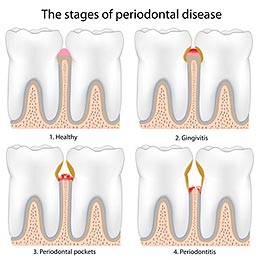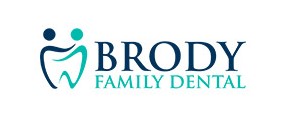Periodontal Disease near Glencairn

Periodontal disease (Periodontitis) damages the gums, ligaments and bone structure that support your teeth. It is caused by the bacterial infection associated with plaque. Plaque is that clear sticky substance that builds throughout the day on your teeth which is removed by regular brushing and flossing. Plaque that isn't cleaned off through brushing and flossing hardens into tartar which must be removed by our Glencairn dentist through 'scaling'.
Tartar that is left on the teeth can cause infection that will accumulate below the gum line. Over time the bacterial infection can result in the gums separating from their grip on your teeth causing 'pockets' between your gum and tooth to develop. These 'pockets' make room for more infection and additional problems to occur including receding and pain in gum tissue as well as loosened damaged teeth and constant breath issues and even tooth loss.
Periodontal disease can be treated and like most ailments, the earlier it is detected the better.
The early stage of periodontal disease is Gingivitis. Gingivitis is extremely common and usually defined by mild gum irritation, minor bleeding during regular brushing and flossing and occasional bad breath caused by the gum infection. Gingivitis is caused by the bacteria from plaque under the gum line. Gingivitis is controllable and treatable with regular brushing and routine dental visits for a thorough cleaning.
Gingivitis left untreated can spread to the bone structure that supports your teeth. This is where periodontal disease sets in. As the infection progresses 'pockets' are formed between your tooth and gum, allowing tartar, bacterial and infection to accumulate and damage the underlying bone. As the Periodontitis advances the 'pockets' deepen allowing the infection to worsen and damage to increase.
Moderate Periodontitis occurs as the 'pocket' deepens down the root the gum separates further from the tooth often causing it to be noticeably receded and tender and the bone holding the tooth in place may be up to 1/3 lost. Allowed to advance, the bone destruction will continue and the tooth will loosen even to the point of falling out or requiring extraction.
To date, researchers have found links between periodontal disease and many of health problems, including:
- Heart disease
- Diabetes
- Dementia
- Rheumatoid arthritis
- Premature birth
Although it is difficult to tell what exactly is behind the correlation, experts believe that it is probably inflammation - which is the body's response to injury. It is believed that oral bacteria can escape into the bloodstreem and injure major organs, including your heart over time.
What to look for:
- Gum symptoms
- Gums that bleed during normal (even gentle) brushing and flossing
- Gums that are tender, sensitive or even painful to the touch
- Gums that are swollen
- Gums that appear shiny or bright red (like in many infections)
- Gums that are receding
Tooth Symptoms:
- Teeth that are loose in an adult
- Teeth that appear unusually long (due to receded gum)
- Teeth with excessive tartar buildup along the visible gum line and in the 'pocket'
How is Periodontitis Treated
Treatment options can vary depending on the extent of the infection. Treatment requires the patient to keep a close eye on the infections development, and may require a change in lifestyle and/or oral hygiene habits.
Professional Cleaning: During a dental checkup at our Glen Park dental office, your Glencairn dentist or hygienist will remove plaque and tartar from around the gum line of all teeth. If you have some signs of gum disease, your Glencairn dental professional may recommend a specific course of action.
Scaling and Root Planing: This nonsurgical procedure is usually performed under local anesthetic. A professional will remove the plaque through a deep-cleaning method called scaling and root planing. Scaling means scraping off the tartar from above and below the gum line. Root planing gets rid of rough spots on the tooth root where the germs gather, and helps remove bacteria that contribute to the disease. In some cases a laser may be used to remove plaque and tartar. This procedure can result in less bleeding, swelling, and discomfort compared to traditional deep cleaning methods.
Medication: Medication may be used with certain treatments. Depending on how far the disease has progressed, your dental professional may still suggest surgical treatment.
Surgical Treatments:
- Flap Surgery
- Bone and Tissue Grafts
- Bone Surgery
- Guided Tissue Regeneration
Please feel free to ask us any questions that you may have regarding Periodontal Disease and Treatments the next time you visit our Glen Park Dental Office, at Dufferin and Lawrence. Book an appointment with us today!






